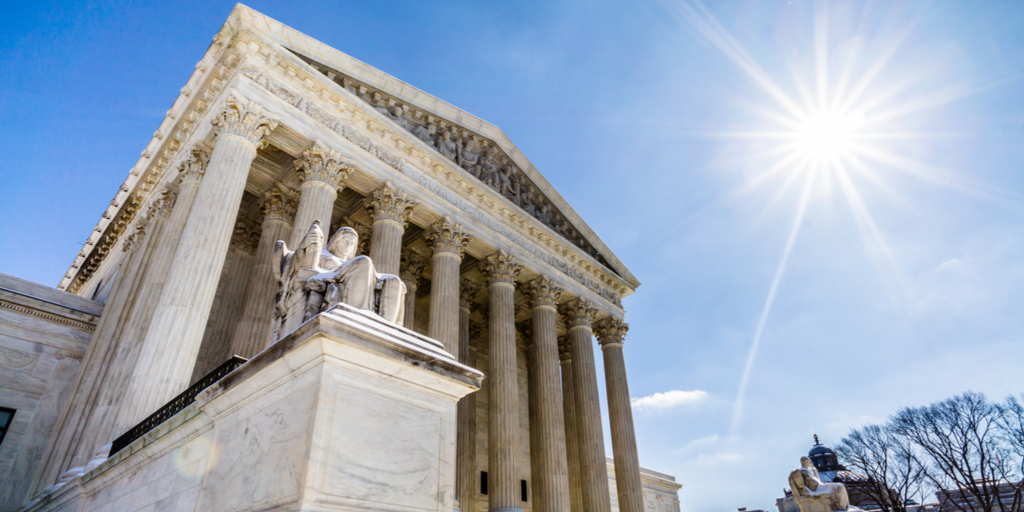Judge Kavanaugh's future record on religious liberty cases will likely resemble that of Justice Kennedy.
The Right to Stay Silent
Today, the Supreme Court is hearing oral argument in a blockbuster free speech case. The case, 303 Creative v. Elenis, presents a crucial question about free-speech rights. What government interests, if any, could ever justify compelling someone “to speak or stay silent”?
The case involves Lorie Smith, a website and graphic designer in Colorado who runs her own studio, 303 Creative. Smith wants to create custom websites promoting weddings. But she is unwilling to use her artistic talents to create websites carrying messages she rejects—including the message that marriage can be anything other than a male-female union. She argues that the First Amendment protects that choice.
Colorado officials disagree. They read their public-accommodations law to require Smith to create custom websites celebrating same-sex weddings if she serves other weddings. That echoes the state’s position in Masterpiece Cakeshop v. Colorado Civil Rights Commission, where Colorado sought to compel a wedding-cake designer to make custom cakes celebrating same-sex weddings. I argued that that, too, was unlawful, but in the end, the Supreme Court resolved the case on other grounds.
In 303 Creative, the free-speech issue is unavoidable and quite focused. There’s no dispute that custom websites, full of words and graphics, are speech protected by the First Amendment. Colorado itself stipulated that Smith’s “graphic designs are expressive” and communicate a message. Nor does anyone deny that Smith sincerely opposes the message about the nature of marriage conveyed by the celebration of same-sex weddings.
The Supreme Court has held that “compelled speech”—state action forcing you to create or engage in speech carrying a message you reject—is unconstitutional, absent a compelling justification. So how do Colorado officials justify this compulsion?
First, they cite the crucial goal of eradicating discrimination. Yet they concede that Smith is “willing to work with all people regardless of classifications,” including sexual orientation. The discrimination here is Smith’s choosing (“discriminating”) among which messages to affirm in the speech she creates—just what the First Amendment exists to protect. The whole “point of all speech protection,” the Supreme Court has declared, is “to shield those choices of [speech] content that in someone’s eyes are misguided, or even hurtful.” Indeed, with maximal relevance here, the Court has twice held that the goal of curbing LGBT discrimination in public accommodations cannot justify using antidiscrimination law to force changes to the content of your speech. Simply put, there is no public-accommodations exception to the First Amendment.
Policing offensive speech is perilous; today’s offensive thought may be tomorrow’s social reform.
To be sure, there would be no free speech problem if a public accommodation law (for speech-neutral reasons) required vendors to engage in conduct they oppose—e.g., the provision of folding-chairs for a wedding reception. Not every moral or religious “complicity” objection implicates speech.
Even a vendor who does create speech products for some customers can be forced to make the same products for other customers if the new products would bear the same message (e.g., posters bearing the same inspirational quote). For then she isn’t being forced to change the content of her speech. But in 303 Creative, the message would change: A website celebrating John and Christine’s wedding does not imply that same-sex bonds are to be celebrated as marriages. A site celebrating John and Christopher’s does. Making a designer use her artistic talents to produce speech carrying a message she rejects “invades the sphere of intellect and spirit which it is the purpose of the First Amendment … to reserve from all official control,” as the Supreme Court has put it.
By analogy, suppose a Jewish person paints custom murals for synagogues bearing the words “you can find the Lord in this synagogue.” If Colorado made her paint custom murals for Christian houses of worship that read “you can find the Lord in this church,” the state would be forcing her to say something new. It wouldn’t matter that the law compelling her speech happened to be a public accommodations law (in this case, one barring religious discrimination).
Second, Colorado cites the need to ensure access to goods and services. But there’s no evidence that respecting the right of designers to control the content of the speech they create would deprive any couple of a wedding website, especially in a nation of over 250,000 graphic designers.
That leaves a third, more intuitively powerful justification: that forcing Smith to speak is necessary to prevent dignitary harm—the distress of being confronted with ideas one finds deeply offensive, hurtful, or demeaning. Colorado asserts that a graphic designer’s declining to create websites for same-sex weddings would inflict dignitary harm on gay couples.
The argument has appeal because offense is a real cost, which cannot be trivialized. But as the Supreme Court has repeatedly emphasized, “[i]f there is a bedrock principle underlying the First Amendment, it is that the government may not prohibit the expression of an idea simply because society finds the idea itself offensive or disagreeable.” Even if the offensive ideas cause real pain. Even if they seem demeaning of minorities. Even in the context of public accommodations laws, and even when those laws concern sexual orientation. In one case, eight of the nine Justices—including Justices Ginsburg, Breyer, Sotomayor, and Kagan—affirmed Westboro Baptists’ right to picket the funeral of a fallen soldier with signs bearing anti-gay slurs and calumnies. If that speech was constitutionally protected, surely Smith’s choice is, too.
Policing offensive speech is perilous; today’s offensive thought may be tomorrow’s social reform. Curbing offense is also impossible in pluralistic societies, where most people hold views offensive to some. Even in this very case, offensiveness cuts both ways: If it’s hurtful to imply that same-sex unions aren’t marital, it’s hurtful to imply that traditional Christian—and Muslim, Jewish, and Hindu—convictions on marriage are bigoted. So free societies tolerate the expression of painful ideas. The First Amendment guards your right to speak or stay silent on their basis.


